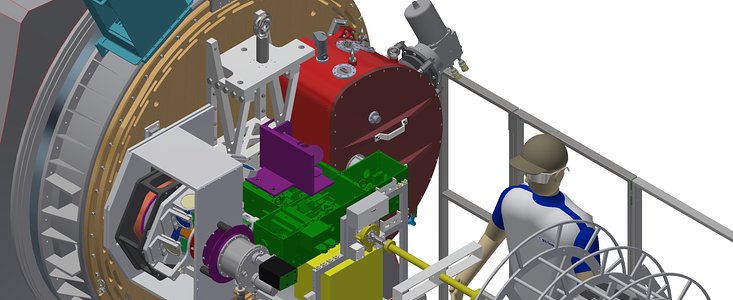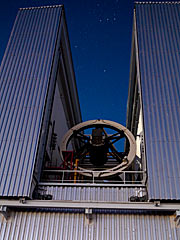Mitteilung
Das La-Silla-Observatorium der ESO erhält hochmodernes SOXS-Instrument
8. Oktober 2018
Die ESO hat mit einem von der INAF, dem italienischen Nationalinstitut für Astrophysik, geführten internationalen Konsortium die Vereinbarung unterzeichnet, ein hochmodernes spektroskopisches Instrument namens Son Of X-shooter, kurz SOXS [1], zu bauen und zu betreiben. Bereits seit 2017 wird an der Konstruktion dieses innovativen Instruments gearbeitet, was bedeutet, dass SOXS schon 2020 auf La Silla installiert werden könnte.
SOXS soll am 3,58-Meter-New Technology-Telescope (NTT) der ESO am La-Silla-Observatorium in Chile eingebaut werden und SOFI ersetzen, ein altehrwürdiges und hochproduktives ESO-Instrument, das mehr als 20 Jahre im Einsatz war. Als einzigartige spektroskopische Einrichtung konzipiert, wird SOXS flüchtige astronomische Quellen untersuchen und dabei Hinweisen und Warnungen von Teleskopen, Satelliten und Detektoren auf der ganzen Welt nachgehen.
SOXS soll wichtige spektroskopische Folge-Beobachtungen für zahlreiche Untersuchungen vorübergehender astronomischer Ereignisse liefern und in der südlichen Hemisphäre das führende Instrument zur Nachverfolgung kurzlebiger Ereignisse werden. Die neuartige, hochspezialisierte Konstruktion des Instruments wird sicherstellen, dass es beinahe ebenso empfindlich ist wie sein Vorläufer X-shooter, obwohl es an einem sehr viel kleineren Teleskop installiert wird.
Vorübergehende astronomische Ereignisse oder auch „Transients“ sind – wie der Name schon vermuten lässt – nur für kurze Zeit sichtbar. Einige der faszinierendsten astrophysikalischen Phänomene gehören dazu, wie etwa Supernovae und Ausbrüche von Gravitationswellen. Es ist wesentlich, dass diese Ereignisse innerhalb weniger Stunden, wenn nicht Minuten, mit spezialisierten spektroskopischen Instrumenten wie SOXS nachverfolgt und beobachtet werden. Transients werden in beeindruckender Anzahl entdeckt, die nur durch künftige Durchmusterungs-Teleskope erhöht werden kann. Die Kombination von SOXS und dem NTT ist daher ein dringend benötigtes astronomisches Werkzeug, um diese flüchtigen Ereignisse in Wellenlängen von Ultraviolett bis ins Nah-infrarote zu erfassen.
Aus seinem neuen Zuhause Am NTT am La-Silla-Observatorium wird SOXS viele verschiedene astronomische Transients in allen Entfernungsskalen und aus allen Bereichen der Astronomie nachverfolgen. Es wird sich kurzfristigen Alarmmeldungen von Weltraum-Teleskopen widmen (wie etwa bei Gammastrahlen-Ausbrüchen) oder von Gravitationswellen-Detektoren, mittelfristigen Alarmen (wie Supernovae und Röntgenstrahlen) sowie der langfristigen Beobachtung unterschiedlicher Quellen (etwa Blazaren und kataklysmischen Doppelsternsystemen), der Transit-Spektroskopie von Exoplaneten oder einmaligen Ereignissen wie dem nahen Vorbeiflug eines neuentdeckten kleineren Körpers. Neben seinen beeindruckenden Fähigkeiten, Flüchtiges zu beobachten, wird SOXS auch in der Lage sein, Routine-Beobachtungen bei Objekten durchzuführen, die für andere Instrumente wie den X-shooter einfach zu hell sind.
SOXS wird voraussichtlich 2020 erstes Licht sehen und 2021 in den regulären Betrieb gehen. Der Vertrag sieht eine Betriebsdauer von fünf Jahren vor, die um weitere fünf verlängert werden kann.
Endnoten
[1] SOXS („Sohn von X-shooters“) ist eine Weiterentwicklung des X-Shooter-Instruments, das am VLT installiert ist. Das SOXS-Konsortium besteht aus: INAF (Italien), dem Weizmann Institute of Science (Israel), der Universidad Andrés Bello & Millennium Institute of Astrophysics (Chile), der University of Turku & FINCA (Finnland), der Queen’s University Belfast (Großbritannien), der Tel Aviv University (Israel) und dem Niels Bohr Institute (Dänemark).
Links
Kontaktinformationen
Hans-Ulrich Käufl
ESO
Garching bei München
Tel: +49 89 3200 6414
E-Mail: hukaufl@eso.org
Sergio Campana
INAF – Osservatorio astronomico di Brera
Via E. Bianchi 46
Merate (LC) – I-23807, Italy
Tel: +39 02 72320418
E-Mail: sergio.campana@brera.inaf.it
Calum Turner
ESO Public Information Officer
Garching bei München
Tel: +49 89 3200 6670
Mobil: +49 151 1537 3591
E-Mail: pio@eso.org
Über die Mitteilung
| ID: | ann18070 |
Our use of Cookies
We use cookies that are essential for accessing our websites and using our services. We also use cookies to analyse, measure and improve our websites’ performance, to enable content sharing via social media and to display media content hosted on third-party platforms.
ESO Cookies Policy
The European Organisation for Astronomical Research in the Southern Hemisphere (ESO) is the pre-eminent intergovernmental science and technology organisation in astronomy. It carries out an ambitious programme focused on the design, construction and operation of powerful ground-based observing facilities for astronomy.
This Cookies Policy is intended to provide clarity by outlining the cookies used on the ESO public websites, their functions, the options you have for controlling them, and the ways you can contact us for additional details.
What are cookies?
Cookies are small pieces of data stored on your device by websites you visit. They serve various purposes, such as remembering login credentials and preferences and enhance your browsing experience.
Categories of cookies we use
Essential cookies (always active): These cookies are strictly necessary for the proper functioning of our website. Without these cookies, the website cannot operate correctly, and certain services, such as logging in or accessing secure areas, may not be available; because they are essential for the website’s operation, they cannot be disabled.
Functional Cookies: These cookies enhance your browsing experience by enabling additional features and personalization, such as remembering your preferences and settings. While not strictly necessary for the website to function, they improve usability and convenience; these cookies are only placed if you provide your consent.
Analytics cookies: These cookies collect information about how visitors interact with our website, such as which pages are visited most often and how users navigate the site. This data helps us improve website performance, optimize content, and enhance the user experience; these cookies are only placed if you provide your consent. We use the following analytics cookies.
Matomo Cookies:
This website uses Matomo (formerly Piwik), an open source software which enables the statistical analysis of website visits. Matomo uses cookies (text files) which are saved on your computer and which allow us to analyze how you use our website. The website user information generated by the cookies will only be saved on the servers of our IT Department. We use this information to analyze www.eso.org visits and to prepare reports on website activities. These data will not be disclosed to third parties.
On behalf of ESO, Matomo will use this information for the purpose of evaluating your use of the website, compiling reports on website activity and providing other services relating to website activity and internet usage.
Matomo cookies settings:
Additional Third-party cookies on ESO websites: some of our pages display content from external providers, e.g. YouTube.
Such third-party services are outside of ESO control and may, at any time, change their terms of service, use of cookies, etc.
YouTube: Some videos on the ESO website are embedded from ESO’s official YouTube channel. We have enabled YouTube’s privacy-enhanced mode, meaning that no cookies are set unless the user actively clicks on the video to play it. Additionally, in this mode, YouTube does not store any personally identifiable cookie data for embedded video playbacks. For more details, please refer to YouTube’s embedding videos information page.
Cookies can also be classified based on the following elements.
Regarding the domain, there are:
- First-party cookies, set by the website you are currently visiting. They are stored by the same domain that you are browsing and are used to enhance your experience on that site;
- Third-party cookies, set by a domain other than the one you are currently visiting.
As for their duration, cookies can be:
- Browser-session cookies, which are deleted when the user closes the browser;
- Stored cookies, which stay on the user's device for a predetermined period of time.
How to manage cookies
Cookie settings: You can modify your cookie choices for the ESO webpages at any time by clicking on the link Cookie settings at the bottom of any page.
In your browser: If you wish to delete cookies or instruct your browser to delete or block cookies by default, please visit the help pages of your browser:
Please be aware that if you delete or decline cookies, certain functionalities of our website may be not be available and your browsing experience may be affected.
You can set most browsers to prevent any cookies being placed on your device, but you may then have to manually adjust some preferences every time you visit a site/page. And some services and functionalities may not work properly at all (e.g. profile logging-in, shop check out).
Updates to the ESO Cookies Policy
The ESO Cookies Policy may be subject to future updates, which will be made available on this page.
Additional information
For any queries related to cookies, please contact: pdprATesoDOTorg.
As ESO public webpages are managed by our Department of Communication, your questions will be dealt with the support of the said Department.


